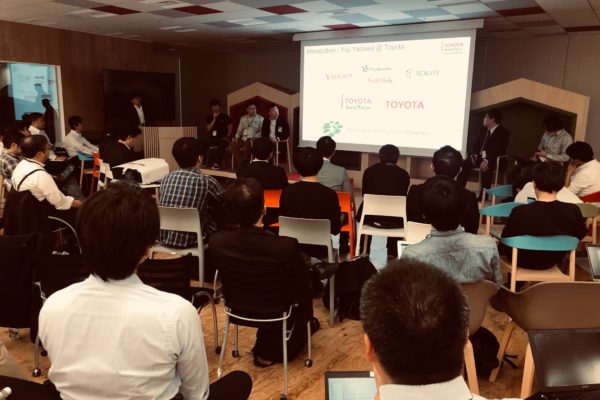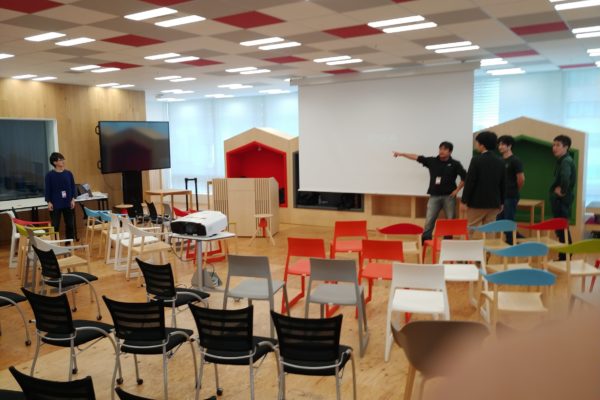The Yahoo! JAPAN Lodge is an incubator space with a vibe that is perfect for the 2nd OpenSDS Japan Meetup.
It was great to see members of the Japan Community Committee moving tables and chairs around to set up the meetup space, and getting ready to welcome attendees before to the meetup.
Yazawa-san, EUAC representative from Toyota, and Chairman of the OpenSDS Japan Community opened the meetup giving it a touch of Japanese formality and dignity.
Next was my State of the Project talk, and I was glad to have some interesting updates including Intel, China Unicom and Sakura Internet formally joining the project.
Sakura Internet came to know about OpenSDS from Kusunoki-san or Kei from NTT Communications, and representative on the EUAC. This is a testament to the open source collaboration opportunities in OpenSDS between two potentially competing businesses.
The next topic I covered was The Open Autonomous Data Platform the community is developing, and Capri — the name of the next release targeted for June. I like to tell people the releases are named after exotic resort islands and that we will plan our future events in these places — then I wait to see their reactions, which is always a mix of ‘you must be kidding’ and ‘yeah, right’.
Capri has many features requested by the EUAC and also features towards autonomous platform. File support will finally satisfy the top request from Yahoo! JAPAN, Automation & Orchestration will please KPN, Object Lifecycle will delight Toyota, and expanded multi-cloud support for GCP and IBM gives end users more choices. Intel’s contribution to Capri is NVMe over Fabric which many end users are looking forward to. Telemetry & Anomaly Detection is the community’s first foray into telemetry data collection and AI/ML. More details and status about Capri can be found on the OpenSDS github.
Yahoo! JAPAN EUAC representative Sato-san together with Takei-san presented and demonstrated the Bali release which featured multi-cloud support for AWS S3, Azure Blob, Huawei Object, and Ceph S3. Yahoo! JAPAN has been supporting OpenSDS in many ways including testing, debugging, demonstrating and sharing about the project. One of their primary use case is storage consolidation for OpenStack and Kubernetes clusters.
Next up, Yazawa-san gave a summary of the Japan community expectations and requests for the project. The Japan community has been running its own bi-weekly community meetings since the beginning of the year, and the summary highlighted the discussions.
The last session was a panel discussion moderated by Kei of NTT Communications, with speakers Yazawa-san of Toyota, Terada-san of IIJ, Tsunematsu-san of GMO Pepabo, Hamono-san of Fujitsu and Xuchuanru of Huawei Japan. The entire session was in Japanese, so let’s just say it was quite an interesting exchange between the panelists comprising both end users and vendors.
We wrapped up the evening with what I assumed was some snacks and drinks — instead we had a feast served up by the Yahoo! JAPAN kitchen. Larry who is in charge of OpenSDS Business Development, reluctantly swiped his card and paid for it. I thought, if the presentations failed to meet expectations, at least this feast should make up enough for it. Yazawa-san gave a toast with ‘kampai’ and we got the party started. In the midst of it, some folks came up to thank me for sharing the project, for the networking opportunity, and for getting the Japan community together. I thanked them back for giving support to the project.
It was nice to see most folks staying until right at the end and when we finally had to vacate the space, they automatically (autonomously?) helped to clean up and restore it.
The OpenSDS Japan Community Committee did a marvelous job organizing the meetup. We expected about 50, ended the evening with about 80, and a community that is asking when is the next meetup. I think that’s a good sign we didn’t screw up the meetup. Thank you OpenSDS Japan Community Committee for such a successful meetup and Yahoo! JAPAN for being such a great host.
No one got drunk — did we not have enough beers?
About OpenSDS:
The Linux Foundation OpenSDS Project is an open source community working to address storage and data management challenges in the cloud native era. The community is developing the Open Autonomous Data Platform for Kubernetes and OpenStack to manage, protect, secure and optimize data on-premise, and across clouds.
For more on the project and how to participate: www.opensds.io














